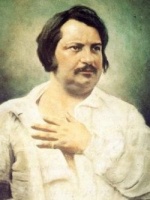Honoré de Balzac: Difference between revisions
Jump to navigation
Jump to search
Pablo Sender (talk | contribs) No edit summary |
No edit summary |
||
| Line 1: | Line 1: | ||
[[File:Balzac.jpg|right|150px]] | [[File:Balzac.jpg|right|150px|thumb|Honoré de Balzac]] | ||
'''Honoré de Balzac''' ([[May 20]], 1799 – [[August 18]], 1850) was a French novelist and playwright. The novel sequence ''La Comédie Humaine'', which presents a panorama of post-Napoleonic French life, is generally viewed as his magnum opus. His writing influenced many famous writers, including the novelists Émile Zola, Charles Dickens, Gustave Flaubert, Jack Kerouac and Henry James, as well as important philosophers such as Friedrich Engels. | '''Honoré de Balzac''' ([[May 20]], 1799 – [[August 18]], 1850) was a French novelist and playwright. The novel sequence ''La Comédie Humaine'', which presents a panorama of post-Napoleonic French life, is generally viewed as his magnum opus. His writing influenced many famous writers, including the novelists Émile Zola, Charles Dickens, Gustave Flaubert, Jack Kerouac and Henry James, as well as important philosophers such as Friedrich Engels. | ||
Revision as of 22:48, 12 January 2017
Honoré de Balzac (May 20, 1799 – August 18, 1850) was a French novelist and playwright. The novel sequence La Comédie Humaine, which presents a panorama of post-Napoleonic French life, is generally viewed as his magnum opus. His writing influenced many famous writers, including the novelists Émile Zola, Charles Dickens, Gustave Flaubert, Jack Kerouac and Henry James, as well as important philosophers such as Friedrich Engels.
Some of his writings were influenced by Emanuel Swedenborg,[1] and Mme. Blavatsky called him "the unconscious Occultist of French literature."[2]
Notes
- ↑ Writers Influenced by Swedenborg
- ↑ Helena Petrovna Blavatsky, The Secret Doctrine vol. I, (Wheaton, IL: Theosophical Publishing House, 1993), 66.
